Featured artists: Drott | Grorr | Alex Ward | Seven Nines and Tens | Fair Wind Pleases ||:
In this final ADA (shorter reviews) update for 2021 Nick Hudson takes a look at recent releases from…
• Drott – Orcus
• Grorr – Ddulden’s Last Flight
• Alex Ward – Gated
• Seven Nines and Tens – Over Opiated in a Forest of Whispering Speakers
• Fair Wind Pleases – Jump Into Autumn
Nick Hudson
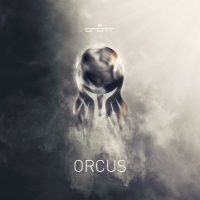
I made the comment in my review of Drott’s eponymous EP that it was curious how it seemed to have been released under the radar, given the musicians who made up the band. So it seems even stranger that this debut full-length release appears to have made no greater waves. Rest assured, if you enjoyed the EP, you’ll love the album. And if you enjoy the more atmospheric and ambient moments of Ulver and Enslaved (bands from which two of Drott’s musicians hail) but don’t yet know Drott, you certainly need to acquaint yourself. The three members of Drott clearly love sonic exploration and experimentation, and the results can be quite eclectic. Where this could be a weakness for some bands, Drott make it a strength. My only complaint about the EP was that it was all over too soon, so is Orcus the longer version I desired?
The answer is not as simple as it might seem. Drott’s EP was all over the place, the disparate styles reminiscent of music from different regions of the world. The transportive soundscapes were suitably and recognisably different, but the differences made sense, and the EP had great cohesion in spite of (or maybe because of) them. While Orcus ostensibly has a concept, it is not a particularly clear one. This means, for me, that despite enjoying all the tracks, they don’t necessarily feel like they belong together. The different musical styles of the EP had a common thread, and though Orcus surely also has something that ties the tracks together, it is not so obvious. As such, Orcus often feels more like a compilation than an album. A carefully compiled and curated compilation, for sure, but a compilation nevertheless.
But, lest it appears I’m not a fan of Orcus, I must assure you that I am. It is a wonderfully eclectic mix of music that is by turns atmospheric, introspective, melancholic, psychedelic, industrial, traditional, minimal, metal, folk, and more. Without resorting to volume or noise, the album can be crushingly heavy, at other times refreshingly light. The two often come one after the other (eg The Marauders sandwiched between the Morricone sounding By the Lunar Lake and subtle yet majestic Grey Gull), and yet this does not clash as one might expect, but sounds like a perfectly natural and organic flow. Sometimes the music is closer to Mike Oldfield than Ulver, and makes me wonder what those two might sound like if they collaborated. The album may not gel for me as well as the EP did, but it provides just as much enjoyment.
Nick Hudson
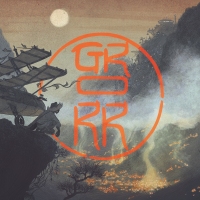
With Ddulden’s Last Flight, Grorr set out to create a concept album that plays like the soundtrack to a film, and I have to say they have succeeded. The album is a majestic slab of grandeur and beauty, and is as visual as it is possible for audio to be. I love the vocals of Franck Michel, who reminds me of Jeff Martin (The Tea Party) and Travis Bracht (Second Coming), and the music is almost like a math and djent-filled and more progressive mix of those two bands, who I love, so it goes without saying that I love this album by Grorr. Other key ingredients to the sound are the numerous traditional instruments played by keyboardist Sylvain Kansara. They seem to hail from all over the world, and the resulting mix means the album has an other-worldly feel that’s never tied to any particular area. This only further emphasises the feel of listening to a film soundtrack, for me.
What’s amazing, though, is how fluid and organic the sound of Ddulden’s Last Flight is, despite comprising one part math rock (with odd and angular time signatures), one part djent (chugging and stuttering) and one part alt-prog (melodic and harmonic). That Grorr manage to so beautifully arrange and mix these styles is impressive in itself; that the result is as cinematic and atmospheric as it is, is even more so. Interludes that are closer to soundscapes merely reinforce this, yet even these more minimal and delicate interludes retain heaviness, sometimes reminiscent of Tool. Christine Lanusse (bass), and Jeremy Chababaux (drums) provide a great deal of this heaviness, in a precise, technical and dynamic manner. No matter the turns and twists of the rhythms, the two are in each other’s pocket. Yoann Estingoy (guitar) simply flies over the top, almost ironically as his heavy tones ought not to fly so high as they do – but then again, perhaps neither should Ddulden have.
So suspend your sense of disbelief and take a magical journey with Ddulden. Enjoy music that is diverse, adventurous, and wonderfully balanced. There are many moods, but the transitions between them are always smooth and seamless. The album carries the listener along with its groove and pacing like the best film soundtracks should. It’s heavy, but not unrelentingly so, and has many subtleties that reveal themselves only after repeated listening. If you have the CD, the story is embellished and elevated by the artwork and plot details, but even without this additional information, the music is sufficient in itself to create an incredibly satisfying visual feast in your imagination, if you let it. So in true advertising speak, if you only “watch” one film this year, let it be Ddulden’s Last Flight.
Nick Hudson
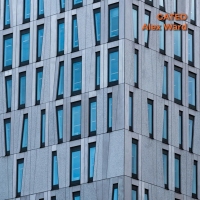
Holy hell, what a glorious cacophony! Apart from programmed drums, Alex Ward plays every instrument on Gated (including clarinets, saxophones, guitars, keyboards, and bass) and almost in competition with each other. Everything clashes and collides wonderfully in an aural assault that you’ll likely either love or hate. Obviously, I love it, and you’ll know within seconds whether you do too. It doesn’t even pretend to ease the listener in gently, so from the first notes of the short and spirited Heat Patch, you’ll know where you stand (or run). Alex Ward is a one man, avant, chamber, free-jazz, dark ambient, noise, and math rock band, taking elements of all these styles while never really sounding totally like any one of them.
After a bruising and battering two track combo, Let allows some respite, though how much is arguable. This third track is quieter and slower-paced, but that doesn’t necessarily make it easier listening. Chinese water torture is also quiet and slow-paced… But again, beauty is in the eye (or, in this case, ear) of the beholder. I have no doubt that Let will be too much for some listeners, but I love it! It’s a dissonant and unnerving highlight of the album. Buyout brings back the heavy math sound after the more chamber prog Let, before the longest (and probably most Marmite) track, the magnificent Hewn. This 18-minute assault takes no prisoners, and may well be too much even for those who enjoy the rest of the album. Somehow, it doesn’t outstay its welcome, so if you manage to make it through, say, the first four minutes, chances are you’ll enjoy the remaining fourteen.
If you’ve made it to the other side of Hewn, you’ll surely be ready and raring for more, and Alex Ward has you covered, as you’re only halfway through Gated, and there is plenty more pleasure and pain to come. Stilled is a refreshing and subtle slice of sorbet to cleanse the palate, discordant, but in a minimalist manner. The clarinet of disquiet is employed, but quietly so. All in all, this is a quite beautiful track, whose impact is only greater after what preceded it. The sequencing of Gated is superb, like a roller coaster designed to ensure every twist and dip can be enjoyed to its full potential. Cushioned is another piece of free improvisation, but this time in a jazzy rather than ambient vein. Perhaps the most accessible track on the album, but being positioned where it is makes this factor rather irrelevant. Anyone who has made it this far is long past caring about accessibility. But for those who have, Cushioned will surely be another highlight.
And, really, I’m not sure why I’m still writing. As per the introductory paragraph, you’ll either love Gated, or hate it. So listen to the opening track and see how you feel…
Nick Hudson
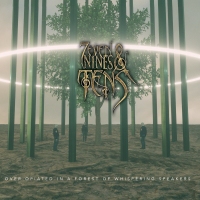
I’d never heard of Seven Nines and Tens before, but with a band name like that, it would surely be a great coincidence if they weren’t fans of Hum. With an album title like Over Opiated in a Forest of Whispering Speakers, it’d surely be a great coincidence if they weren’t also fans of The Tragically Hip. One listen to the album, and it’s as confirmed for me as much as it can be, without taking to Google to find out. But that’s not something I’ve ever liked to do; I like to know that my thoughts are mine, and not influenced by things I’ve read. What I hear is music that is as complex, multi-faceted and heavy as it is melodic, focused and accessible, and that (yes) is reminiscent of both Hum and The Hip. But I also infer a lot of Cave-In influence, and perhaps even some Sunny Day Real Estate and Catherine Wheel. Maybe some Radiohead, Alcest or Blut Aus Nord. However, the progressive metal of Seven Nines and Tens never really sounds like any of those bands, so much as reminds me of them.
In fact, even calling it progressive metal does Seven Nines and Tens a disservice, as the elements that contribute to that overall sound include pretty much any genre you can throw a post in front of. Thus post-hardcore, post-metal, and post-rock. Add in some jazz, some psych and some math, and you’re good to go. Yes, I’m serious, as Seven Nines and Tens offer up a pleasantly progressive melange of all these. When it comes to prog metal stereo-types, the usual suspects are Dream Theater, Opeth, Porcupine Tree and Tool. A great deal of newer bands have a sound that is heavily and obviously influenced by one of these. To Seven Nines and Tens credit, they show no derivation from any of these, and it would be entirely believable if the band said they’d not really listened to any of these. And when I reflect on the bands I’ve mentioned, very few are actually metal bands. Yet, there’s no doubting that the music of Seven Nines and Tens is a form of progressive metal. Perhaps the band’s name is appropriate then, as their genre-fluid sound is almost as inscrutable as the Hum lyric.
I can’t figure out if it’s simply because the band is Canadian, and I’m hearing something that isn’t there because I want to, but I swear I hear elements of Rush in Seven Nines and Tens. Only subtle nods, mind you, but there are hints of heavy ’70s progressive rock to my ears. I can’t help but think that nested somewhere in those trees on the cover is a white owl (one that flies by night…). All in all, I’m reminded of a great deal of quite disparate bands, but they are all bands whose music I enjoy. I may never have heard of Seven Nines and Tens before, but I will definitely be checking out their previous releases based on my enjoyment of this one. I can only hope it’s not the last of the unplucked gems…
Nick Hudson
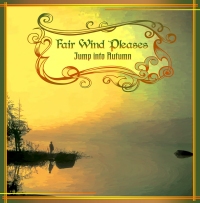
Fair Wind Pleases have provided me with two of my favourite releases of 2021. Jump Into Autumn is described on the Bandcamp page as the third Fair Wind Pleases album, and second live album, but this is slightly misleading. The Wind of the Season, released at the beginning of the year, was largely recorded live. Only the guitars and bass clarinet for that album were recorded afterward (and in the case of the guitar, this did show through somewhat, as I alluded to in my review). For the performance captured on Jump Into Autumn, the drums and percussion are retained from the second album (absent from the debut), but the guitar features only on the last track (taken from a different performance than the remainder of the set, so in effect a bonus track of sorts). This means that each of the three Fair Wind Pleases albums released so far have a different dynamic and sound, which is quite neat. But the prominence and importance of the clarinet in this avant chamber prog group is what remains most enjoyable for me.
With three albums released in just over a year, and all originating from recordings of live performances, it’s quite impressive that there is very little repetition. In fact, this is the first album that contains a track from a previous release – 7, from second album The Wind of the Season. Preceding this is La Gentilezza, which is described as a Roz Vitalis cover. While true, it’s almost overstating the fact, because (as far as I’m aware) La Gentilezza has only appeared as a piano solo leading into the following track on the Great Expectations Live album, where it worked almost as an extended introductory piece. Admittedly, this version is augmented by additional instrumentation, and approaches twice the length of the Roz Vitalis performance, so it is far more of a number in its own right. Following these two tracks is probably my favourite of the album – the second part of the title track. It has a martial beat that sounds more like children playing at being soldiers than the actual thing, reminding me a little of Prokofiev’s Peter and the Wolf, even if it doesn’t sound like that in any shape or form.
The same is almost true of the next track, a cover of one of Le Orme’s most famous songs. Fair Wind Pleases’ cover approximates the shape and form of Amici de Ieri, but it’s only just recognisable. I have to say I far prefer Fair Wind Pleases’ interpretation and arrangement, which provides both elegance and edge that the original lacked. It’s at this point that I have my only real complaint about the album, as the final track really does feel tacked on. The album could have ended beautifully with Amici de Ieri, and the transition to the next track – from a different performance, with a different line-up – is really quite jarring. It’s a shame as the number itself (Impacted by Difficult Summer) is really quite beautiful. I guess I’d rather have heard this track with more from the same performance than added to the one that makes up the majority of Jump Into Autumn. I do like the contrast, though, between this track (with guitar but no drums), compared to the remainder (with drums, but no guitar). So my complaint is a small one, and this is another fantastic release from Fair Wind Pleases. I can’t wait for the next one!

